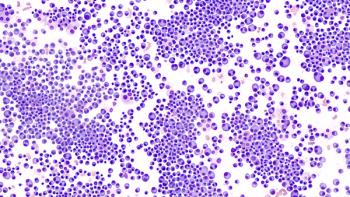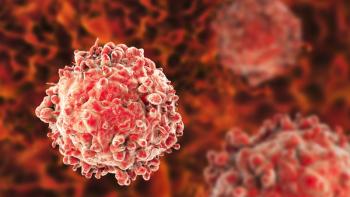
Immunotherapy Plus Chemo Improves Metastatic TNBC Outcomes
The frontline combination of pembrolizumab (Keytruda) and chemotherapy significantly improved progression-free survival (PFS) compared with chemotherapy alone in patients with metastatic triple-negative breast cancer (TNBC) whose tumors expressed PD-L1 (combined positive score [CPS] ≥10), meeting one of the dual primary endpoints of the phase III KEYNOTE-355 trial.
The frontline combination of pembrolizumab (Keytruda) and chemotherapy significantly improved progression-free survival (PFS) compared with chemotherapy alone in patients with metastatic triple-negative breast cancer (TNBC) whose tumors expressed PD-L1 (combined positive score [CPS] ≥10), meeting one of the dual primary endpoints of the phase III KEYNOTE-355 trial (NCT02819518).1
The results, which are from an interim analysis conducted by an Independent Data Monitoring Committee (IDMC), showed that the addition of pembrolizumab to nab-paclitaxel (Abraxane), paclitaxel, or carboplatin/gemcitabine showed a statistically significant and clinically meaningful improvement in PFS compared with chemotherapy alone in this patient population. The IDMC recommended that the study continue without changes, in order to evaluate overall survival (OS), which is the other dual primary endpoint.
The safety profile of pembrolizumab was also found to be consistent with prior studies with the PD-1 inhibitor, and no new safety signals were identified. Full findings will be presented at an upcoming medical meeting and will be discussed with regulatory authorities, Merck, the developer of the PD-1 inhibitor, stated in a press release.
“Triple-negative breast cancer is an aggressive malignancy. It is very encouraging that Keytruda in combination with chemotherapy has now demonstrated positive results as both a first-line treatment in the metastatic setting with this trial, and as neoadjuvant therapy in the KEYNOTE-522 trial,” Roger M. Perlmutter, MD, PhD, president, Merck Research Laboratories, stated in the press release. “We look forward to sharing these findings with the medical community at an upcoming congress and discussing them with the FDA and other regulatory authorities.”
In the two-part, randomized, phase III KEYNOTE-355 trial, investigators evaluated pembrolizumab in combination with investigator’s choice of either nab-paclitaxel, paclitaxel, or gemcitabine/carboplatin compared with placebo plus 1 of the 3 chemotherapy regimens in patients with locally recurrent inoperable or metastatic TNBC who have previously received chemotherapy in the metastatic setting.
In party 1 of the study, which was an open-label design, investigators evaluated the safety and tolerability of pembrolizumab in combination with 1 of the chemotherapy regimens in 30 patients. Part 2 of study was double-blinded; the dual primary endpoints were OS and PFS in all patients, as well as in those whose tumors expressed PD-L1 (CPS ≥1 and CPS ≥10). Secondary endpoints were objective response rate, duration of response, disease control rate, and safety.
To be eligible for enrollment, patients also must have had measurable disease based on RECIST v1.1 criteria as determined by local radiology review, an ECOG performance status of 0 or 1, and a life expectancy of ≥12 weeks from randomization. Those who had not recovered from an adverse event from prior therapy, had grade ≥2 neuropathy, an active autoimmune disease that required systemic therapy within 2 years, known active central nervous system metastases, or active or a history of interstitial lung cancer could not enroll on the trial.
In part 2, 847 patients were randomized to receive placebo or pembrolizumab at 200 mg intravenously (IV) on day 1 of each 21-day cycle plus either nab-paclitaxel at 100 mg/m2 IV on days 1, 8 and 15 of each 28-day cycle; paclitaxel at 90 mg/m2 IV on days 1, 8 and 15 of each 28-day cycle; or 1000 mg/m2 of gemcitabine and area under the curve (AUC) 2 of carboplatin on days 1 and 8 of each 21-day cycle).
Earlier findings of pembrolizumab as monotherapy did not show a benefit with the checkpoint inhibitor in this patient population. In the phase III KEYNOTE-199 trial, single-agent pembrolizumab did not meet a prespecified endpoint of superior OS compared with chemotherapy as a second- or third-line treatment for patients with metastatic TNBC, missing the primary endpoint of the phase III KEYNOTE-119 trial.2 Because the primary endpoint was not met, other endpoints were not formally tested as per the study protocol.
The PD-1 inhibitor has, however, shown benefit in the neoadjuvant setting. In the phase III KEYNOTE-522 trial, patients with newly diagnosed, operable, stage II/III TNBC received both neoadjuvant and adjuvant systemic therapy. In the neoadjuvant phase, patients were randomized 2:1 to receive pembrolizumab at 200 mg every 3 weeks or placebo. All patients were administered carboplatin/paclitaxel for 4 cycles followed by doxorubicin or epirubicin, plus cyclophosphamide for an additional 4 cycles prior to surgical resection. Following surgery, patients were treated with pembrolizumab or placebo for ≤1 year.
Results showed that, regardless of PD-L1 expression, patients on pembrolizumab had a pathologic complete response rate of 64.8% versus 51.2% with placebo, representing an absolute difference of 13.6% (95% CI, 5.4%-21.8%; P = .00055).3
Pembrolizumab is also being evaluated across TNBC settings in the phase III KEYNOTE-242 trial (NCT02954874).
References
1. Merck’s Keytruda (pembrolizumab) in combination with chemotherapy met primary endpoint of progression-free survival (PFS) as first-line treatment for metastatic triple-negative breast cancer (mTNBC) [news release]: Kenilworth, NJ. Merck. Published February 12, 2020. https://bit.ly/2vw4yaH. Accessed February 12, 2020.
2. Merck provides update on phase 3 KEYNOTE-119 study of Keytruda (pembrolizumab) monotherapy in previously-treated patients with metastatic triple-negative breast cancer [news release]: Kenilworth, NJ. Merck. Published May 20, 2019. https://bit.ly/2WYCRjO. Accessed May 20, 2019.
3, Schmid P, Park YH, Ferreira M, et al. KEYNOTE-522: phase 3 study of neoadjuvant pembrolizumab + chemotherapy versus placebo + chemotherapy, followed by adjuvant pembrolizumab versus placebo for early triple-negative breast cancer: pathologic complete response in key subgroups and by treatment exposure and residual cancer burden. Presented at: 2019 San Antonia Breast Cancer Symposium; December 10-14, 2019; San Antonio, TX.
This article originally appeared on OncLive as, "
Newsletter
Knowledge is power. Don’t miss the most recent breakthroughs in cancer care.















































































